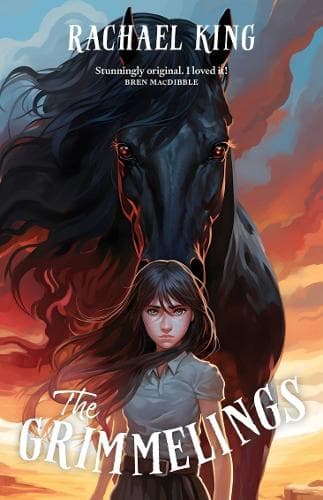Mother-daughter review: The Grimmelings by Rachael King
Reviewed by Kirsteen Ure
Kirsteen Ure and her daughter Libby (11) are spellbound by Rachael King’s new intermediate-age fantasy book, The Grimmelings.
'I don't like horses.'
'It's not a horse book.'
'There's a horse on the cover.'
‘It’s a kelpie, a vengeful kelpie.’
Kirsteen: Libby (the same kid who at five was so immersed in the My Little Pony universe that we used to play a version of twenty questions we called 'I'm thinking of a pony') now at eleven was not into horses and not convinced her mother had it right about Rachael King's new children's book The Grimmelings.
And like Morag, the mother in The Grimmelings, I didn't have it quite right. It is a horse book (Libby: I told you, Mum), one with enough riding to hold the interest of any kid who loves ponies and equestrian details. But it's also a fantasy story steeped in Scottish folklore. It's genre-defying. A gripping and cleverly crafted book about liminality that is itself liminal: it has one hoof in a realistic horse story and another in magical adventure.
Despite our differences on what exactly the book was, Libby and I sat down together to read The Grimmelings. Thirteen-year-old Ella is the main point of view character, though the book is also interspersed with a few moments that give the perspective of her mother, Morag — a reversal of our mother-daughter approach to writing this review.
Libby: What about Fiona, Mum???
Kirsteen: Yes, we also get point-of-view chapters from Libby's favourite character, Ella's younger sister Fiona.
Libby: There are a lot of reasons I like Fiona. She's sweet, quirky and incredibly clever. Her hobby is collecting random items, bird nests, feathers, bones and TEETH and making them into charms and protective ornaments. She knows before Ella what, and who, the kelpie is.
Kirsteen: There was plenty to pique our mutual interest: a mysterious black horse; a missing boy; another boy, new to town, arriving just in time to join the search; a town which has never warmed to Ella's family; and the question of an immaculate equine conception. Several years earlier, Olive, the white mare, gave birth to a foal — a black and white pony — Magpie, who won't let anyone but Ella ride her.
Libby: There were many things that got me hooked, but the main one was where Ella, Morag, Fiona, Grizzly and Mrs Underhill all share the same dream, about the big black horse (kelpie) and the missing boy, Josh Underhill. It left me wondering: how is that possible? What did it mean? Why has this happened?
Kirsteen: Back to the mother though. It's unusual to get close to a parent's perspective in middle-grade or young-adult fiction, but Morag is realistically drawn – a real person with her own problems. Ella's father has been missing, likely drowned, for years, her grandfather too drowned in the lake and the weight of keeping the family's South Island high country horse trekking business afloat — as well as Ella's grandmother's failing health — are all pressing on Morag.
Libby: That's boring, Mum, let's talk about the tooth.
Kirsteen: The tooth then ... in Fiona's collection is a yellowed tooth as long as little Fiona's hand is wide. An unsettling glimpse into the dentistry of the mysterious black horse, a kelpie, a loch monster, out of place on the shores of a South Island lake and as far from home as Ella's Scottish grandmother Griselda.
Libby: Her name is Grizzly, Mum.
Kirsteen: in many ways, The Grimmelings is Grizzly's story. Each morning, Grizzly gifts Ella a word, a scrawl on a scrap of paper, many of them Scottish. Some of the book's chapters open with one or more of these gifted words. They relate to the action in the chapter and often connect to nature. Liminal, is one of the words defined in this way in an early chapter, others include blirt (a sudden gust of wind and rain or a fit of crying) and braw (handsome).
Libby: I found the new words interesting, and I think I would recognise a few of them if I read them in another book. A few months ago, my friend and I were trying to learn Scottish Gaelic (my Grandad is from Glasgow, and my friend has Scottish heritage too).
Red sky at night, reviewers’ delight: The beautiful cover art of The Grimmelings, taken during the grimmelings (sunset) in Tāmaki Makaurau.
Kirsteen: the titular grimmelings is the first word defined in this way. It refers to the first and last glimmers of light in the day; when the day meets night, one thing becomes another, and aspects that might ordinarily be considered opposites connect. Rachael King's storytelling is compelling and careful, and there's plenty of imagery in the story that draws into the idea of light meeting dark. Magpie, the pony, is black and white, sired by the kelpie and named for her resemblance to the birds that frequent the paddocks nearby; the magpies themselves — black and white feathered enemies of the kelpie; and Fiona and Ella with their distinct and different hair.
Words, according to Grizzly, bind you to a place. Has she bound her grandchildren to Scotland — to its weather, lochs, and folklore? A monster is never welcome, but the kelpie, like the protective rowan Grizzly plants along the lake shore, is out of place in Aotearoa, a fantastical invasive species. The idea powering The Grimmelings is intriguing and unsettling: we leave home and cross oceans but still bring our words, our culture, and our monsters along for the ride to wreak havoc in new places and hold other people hostage.
Libby: I think ... we're done.
Reviewed by Kirsteen Ure and Libby Timmins (11).
